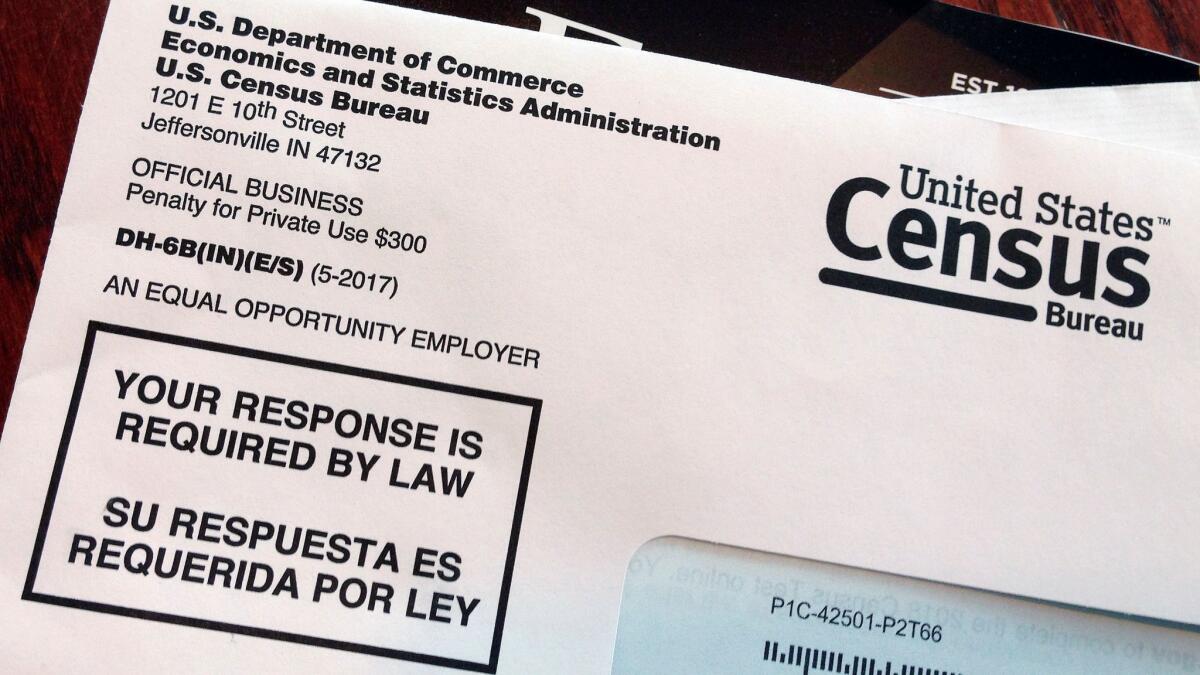Trump citizenship question on 2020 census is blocked by court

- Share via
A federal judge has ruled against the Trump administration’s addition of a citizenship question to the 2020 census.
In the first major ruling on the controversial question, Judge Jesse Furman of the U.S. District Court for the Southern District of New York ordered the administration to stop its plans to add the question to the survey “without curing the legal defects” identified in his opinion.
Plaintiffs hailed the decision. “This ruling is a forceful rebuke of the Trump administration’s attempt to weaponize the census for an attack on immigrant communities,” said Dale Ho, director of the Voting Rights Project at the ACLU, which was a plaintiff in the case.
The Trump administration had tried several times to stop the case from going forward, including requests to the Supreme Court; the adminstration is likely to appeal Furman’s decision to the high court.
Plaintiffs in the trial include 18 states and several cities and jurisdictions, along with civil rights groups. The trial addressed two of seven lawsuits that arose from Commerce Secretary Wilbur Ross’ March decision to add the question. Two more trials over the questions are underway or about to begin.
Opponents of the question say it will reduce response rates in immigrant communities and make the constitutionally mandated decennial survey more costly and less accurate. The government had said the question was necessary to enforce the Voting Rights Act.
Justice Department spokeswoman Kelly Laco, said, “We are disappointed and are still reviewing the ruling,” and added that the government is “legally entitled to include the question on the census.”
A key question in the leadup to the trial was where the request to include the question had originated. Ross testified before Congress that it came from the Justice Department, but documents released in the case indicated that he had asked the Justice Department to make the request after consulting with White House advisor Stephen K. Bannon and others.
Census experts applauded Furman’s ruling. “The Administration decided to play fast and loose with the census and received a strong, direct rebuke from the federal courts,” said Thomas Wolf, counsel with the Democracy Program at the Brennan Center for Justice at New York University School of Law. “Today’s ruling puts the wind at the backs of the challengers, not just in this case, but in all of the cases challenging the citizenship question around the country.”
Those include a trial currently underway in California and another due to begin next Tuesday in Maryland, both of which the administration has sought, unsuccessfully, to stop.
Democratic lawmakers had railed against the addition of the question, saying it would lead to an undercount that could affect congressional redistricting as well as the distribution of federal funding. Undercounts caused by the question would be more likely in Democratic-leaning areas where there are large immigrant communities.
Democratic lawmakers have said they will seek to defund or otherwise block the question if it is not stopped by litigation.
Sen. Brian Schatz (D-Hawaii) on Tuesday praised the ruling, saying that it “confirms what we knew all along: the addition of a citizenship question to the 2020 census was politically motivated and unlawful.”
Six former Census Bureau directors who served under Republican and Democratic administrations have opposed adding the question, which has not undergone the rigorous testing new questions generally go through before being added to the forms.
Testing of 2020 census questions has been completed, but after an outcry about the untested citizenship question, the Census Bureau said it plans to test the question this summer. That testing would come after forms are scheduled to be printed, but could help the bureau anticipate and plan for the question’s effect on response rates.
The administration is expected to appeal Tuesday’s ruling to the U.S. 2nd Circuit Court of Appeals, and up to the Supreme Court.
The Supreme Court already has scheduled a hearing on one aspect of the case, but it seems likely the administration would ask the court to broaden that inquiry.
On Feb. 19, the court is to consider whether Ross and others can be compelled to answer questions about their decision to add the question. The legal issue is whether challengers of that decision must rely on the administrative record offered by the department, or whether the motivations of the officials should also be considered.
In October, the Supreme Court intervened to block the deposition of Ross but allowed other depositions and the trial to go forward.
Because the administration says time is of the essence — the forms must be finalized by June — it could ask the Supreme Court to expand its review to consider Furman’s decision. But that might prompt the court to delay the oral arguments scheduled for February.
The administration in its briefs has already told the court that adding the question was unremarkable. “With the exception of 1840, decennial censuses from 1820 to 1880 asked for citizenship or birthplace in some form, and decennial censuses from 1890 through 1950” also included the question, the administration said.
But it has not been on the decennial form since 1950, a time when immigration was not the political hot button that it is now. A citizenship question does exist on the American Community Survey, a questionnaire that goes out to much smaller subsets of the population.
The Washington Post’s Robert Barnes contributed to this report.
More to Read
Sign up for Essential California
The most important California stories and recommendations in your inbox every morning.
You may occasionally receive promotional content from the Los Angeles Times.













